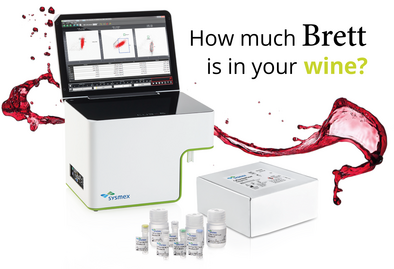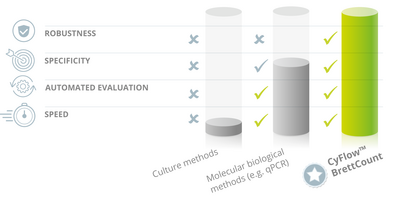CyFlow™ BrettCount
Test kit for fast and automated quantification of Brettanomyces bruxellensis
(Dekkera bruxellensis) in sample materials from the wine production process
Wine with or without Brett?
The CyFlow™ BrettCount test kit allows for a swift and reliable quality control in all stages of wine production, from fermentation to final bottled product. The evaluation is fully automated using the CyFlow™ Cube 6 flow cytometer. An identification and quantification of viable Brettanomyces bruxellensis cells is available within a few minutes. Thus, they can be detected quickly, reliably and highly specifically to avoid possible wine defects such as turbidity and unpleasant odor.

Your Advantages
highest specificity by applying gene probe technology
automated evaluation by flow cytometry
fast quantitative results at cell level
low detection limit
only living Brettanomyces bruxellensis are detected
perfect suited for routine analyses
Product specifications
| Detection of | Brettanomyces bruxellensis / Dekkera bruxellensis |
| Analyzable sample material, e.g. | wine and all stages of wine production |
| Technology | Flow VIT® |
| Evaluation | via VIT® adapted flow cytometer |
| Analysis type | qualitative and quantitative analysis |
| Additional functions | automated PDF report |
| Evaluation time | 3 minutes per sample |
| Scope of supply | analysis reagents product manual |
| Package size | 50 analysis |
Cooperation with Sysmex
The test kit CyFlow™ BrettCount has been developed in close cooperation with Sysmex Partec GmbH, the pioneers of flow cytometry. This partnership allows us to create more effective and cost-efficient solutions for industrial microbiology and to raise microbiological quality control to a higher level.
CyFlow™ Cube 6 and CyFlow™ BrettCount are distributed by the local Sysmex Corporation sales offices.
Detection techniques for Brettanomyces / Dekkera in comparison
With CyFlow™ BrettCount, detection of the yeast type Brettanomyces bruxellensis is faster and easier than with conventional, cultre-based methods. Even viable, but non-culturable yeasts (VBNC) can be specifically detected and quantified. In contrast to other molecular biological methods, inhibitor components in the sample material do not play any role if you perform an analysis with CyFlow™ BrettCount. Thanks to the VIT® gene probe technology, only living microorganisms are detected. False-negative as well as false-positive results are avoided.

Why do Brettanomyces cause wine faults?
Brettanomyces bruxellensis (short: "Brett"), also known as Dekkera bruxellensis, is a yeast fungus that reduces the tannins present in the wine to volatile phenols, producing undesirable compounds like 4-ethylphenol and 4-ethylguaiacol. For this reason, red wines with high tannin content or some natural white wines are often affected by turbidity and the wine faults.
The off-flavors released after contamination with this yeast smell animalic and have an animallike scent that is often compared to the smell of a stable, leather, tea or "wet fur" and "horse sweat". In low concentrations however, the ethylphenols produced can be perceived as pleasant. In red wines in the upper price range, wine connoisseurs consider these slight Brett-notes (smoky, leathery, spicy) even as a sign of quality.

Where does the contamination come from?
The Brettanomyces yeast strain is tolerant to alcohol, but not involved in the alcoholic fermentation. The Brett smell occurs only in the course of wine maturation in wooden barrels. The wine production chain can be contaminated even at its earliest stages, e.g. via raw materials (grapes and must). In addition, Brettanomyces bruxellensis is a spore-forming yeast. Used barrels, a lack of hygiene, low-level sulfuration or foregoing filtration can favour a contamination and turbidity of the end product.